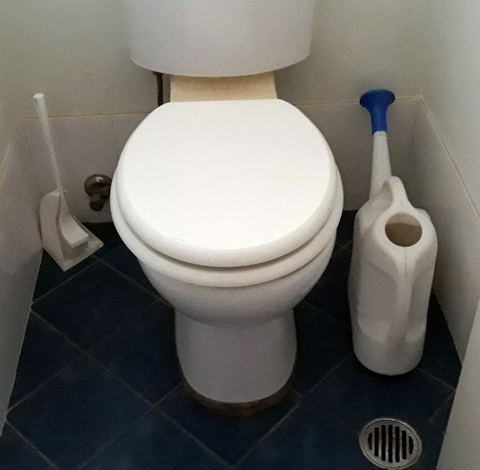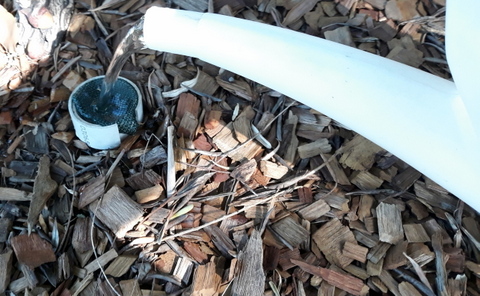While urine may be considered (to use the scientific term) ‘icky’, it may also be considered a valuable resource. It is a high nitrogen fertiliser and also contains other plant nutrients such as phosphorus, potassium, sulphur, calcium and magnesium as well as sodium and chloride and other micronutrients in varying amounts depending on the donors' diet. The amount produced per day will vary depending on how much water the donor drinks but it usually somewhere between 0.8 to 1.5 litres per day for an adult. Over a year the urine of one adult can provide 2kg to 4kg of nitrogen.
I found the above information while trawling through the net on various sites as well as reading through some scientific reports. A good one from Finland is available below.
For several years we have been using urine as a fertilizer, particularly on fruit and other trees, by the simple method of keeping a watering can (white, to fit in with the toilet décor of course!) beside the toilet. Whoever wants to donate (usually me) uses the watering can instead of the toilet.

Collection vessel in place
Once we have accumulated a couple of centimetres in the bottom of the watering can I dilute it approximately 1 part urine to 10 parts water. Although I have read that anywhere between 1:8 and 1:20 is OK, so I don’t think that the dilution is ratio is critical beyond a certain point. In fact, Jackie French in her book ‘Organic Control of Common Weeds’ recommends undiluted urine which has been aged 24 hours as a weedicide, so fresh and diluted is the way to go.
Undiluted pee can be added to your compost pile and counts as a high nitrogen ‘green’ (as opposed to high carbon ‘brown’s) component. Adding pee to your compost may also act as an activator, speeding up the decomposition process.
Recently I have become concerned about the level of sodium in urine, particularly as our soil is somewhat clayey and sodium is detrimental to its texture. Also, unless regularly flushed through the soil, sodium can build up, resulting a salty soil that plants won’t do well in. Some plants tolerate salt in soils better than others but I think the key is to not use lots of urine in one place for a long time, but spread the good news around! (more on this in an upcoming article).
Also, while the current opinion seems to be that urine is sterile, a study (see below) challenges this idea but in the end has determined that it is still safe to use as a fertiliser. However, if a pee donor is unwell, their pee should not be used, particularly on edible crops, as a precautionary measure and if the pee donor is on medications such as antibiotics or antivirals it would be prudent to flush rather than use their pee as fertiliser.
Should you have any doubt, I have read that people can kill any bacteria present merely by sealing up the fresh pee in a sealed container for weeks or months, allowing the urea to break down into ammonia and thereby killing off any errant bugs. What the studies don’t mention is how badly the smell of the aged pee takes your head off when you finally open the sealed container!

Dilute stuff being applied to a fruit tree using a deep pipe waterer
Anyway, the controlled and thoughtful use of your pee as a fertiliser as part of your fertility management program can help you recycle nutrients and replace some imported fertiliser, thereby allowing you to grow your produce more sustainably and productively.



